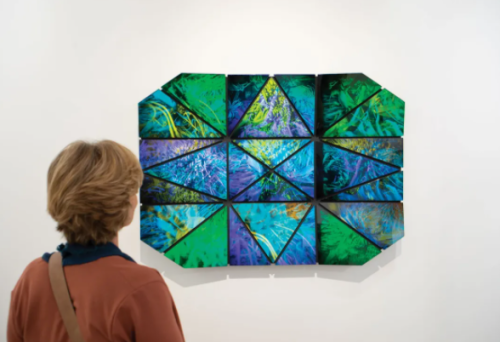
‘Analogue version of augmented reality’: holographic work from Sarah Meyohas’s Interferences series (begun in 2021), at Marianne Boesky’s standPhoto: David Owens
'It shouldn’t be a surprise that easily traded JPEGs are not "safe" assets': artist Sarah Meyohas on the NFT market
The French-US artist is showing a hologram sculpture with Marianne Boesky at Art Basel
Anny Shaw
17 June 2022
Only a year after the Bitcoin network first came to life in 2015, the French-US artist Sarah Meyohas created her BitchCoin project, for which she developed her own cryptocurrency with the idea that collectors should invest directly in artists instead of works of art. The inspiration came, Meyohas says, from the invention of Bitcoin, which she describes as a “creative act”.
She adds: “Bitcoin has the most inspiring origin story. An anonymous person creating a system of value that can stand separately from all institutions. It wasn’t made by a corporation within the boundaries of a legal system.” Created before the advent of Ethereum, the BitchCoin is thought to be the first ever artist-minted token on a blockchain network—an early precursor to NFTs.
This week Bitcoin has taken a battering, falling 25%, its lowest value in 18 months. The immediate trigger appears to be a massive sell-off by investors. Of the plunge in prices, Meyohas acknowledges the “market downturn”, but notes it is “important to separate market concerns from the technology rails, even though they have of course enabled the creation of this market in the first place”. The knock-on effect for the NFT market is inevitable. As Mayohas puts it: “We are entering a recession, and there is a flight to safety. It shouldn’t be a surprise to anybody that easily traded JPEGs are not ‘safe’ assets.”
At Art Basel, Meyohas is showing a hologram sculpture from her Interferences series, which her gallery Marianne Boesky sold to a private US collector for $295,000. Though analogue, the piece relates to her digital work “in that it is the analogue version of augmented reality”, she says. “It is a recording and recreation of light waves. With all our talk of a metaverse, Interferences create an augmented reality that is unlike any screen technology out there.” Meyohas adds: “The Interferences series can only truly be experienced in person. They require the optics of your eyeballs when you stand in front of it.”